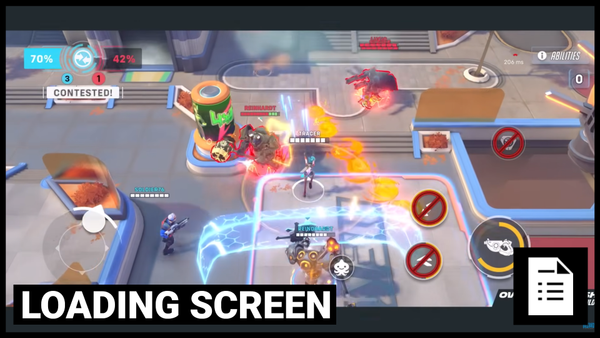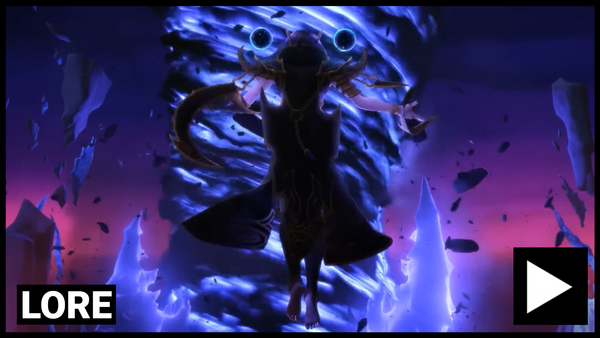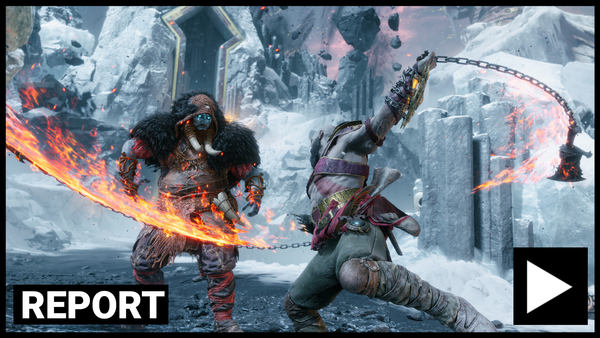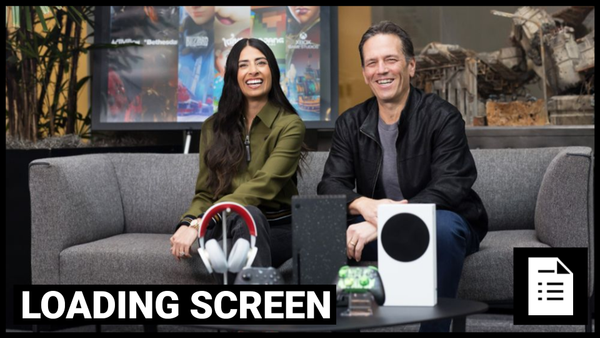Games Media is Being Failed By Its Owners
You, the audience are not being served by the Games Media being consolidated and gutted to produce content rather than journalism. So today we’re going to take you through this story, and a wider look at the ecosystem. And how you’re being failed by the interests of very few people.

“I worry that, now that the machine has increased in size, it will necessarily crush my most talented peers from the Network into writing boring, SEO-focused things designed to appeal to the averaged-out reader. But people aren't average, so when you try to appeal to the average you end up appealing to nobody”. - these are the words of Ex Rock Paper Shotgun Editor Alice Bell speaking to aftermath following layoffs across some of the biggest sites in games media in the wake of consolidation.
You, the audience are not being served by the Games Media being consolidated and gutted to produce content rather than journalism.
So today we’re going to take you through this story, and a wider look at the ecosystem.
And how you’re being failed by the interests of very few people.
- Last night, IGN Entertainment, the corporate subsidiary of Ziff Davis that owns IGN, MapGenie, HowLongToBeat, and Humble Bundle bought The Gamer Network of sites.
- This had been talked about for a while, going up for sale months ago.
- Gamesindustry.biz, RockPaperShotgun, Eurogamer, Dicebreaker and VG24/7 were all bought from Reedpop.
- Alongside partial interests in Outside Xbox, Digital Foundry and the Hookshot group (Nintendo Life, Push Square, PureXbox and Time Extension).
- Based on rankings from Similarweb - Ziff Davis just added 100m visitors per month to their portfolio of games sites.
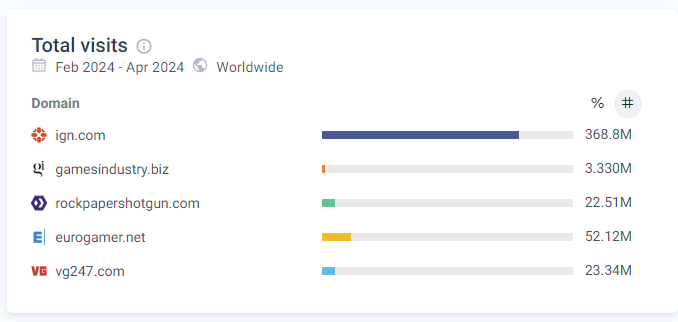
- In an industry where IGN was already comfortably the largest player in the space.
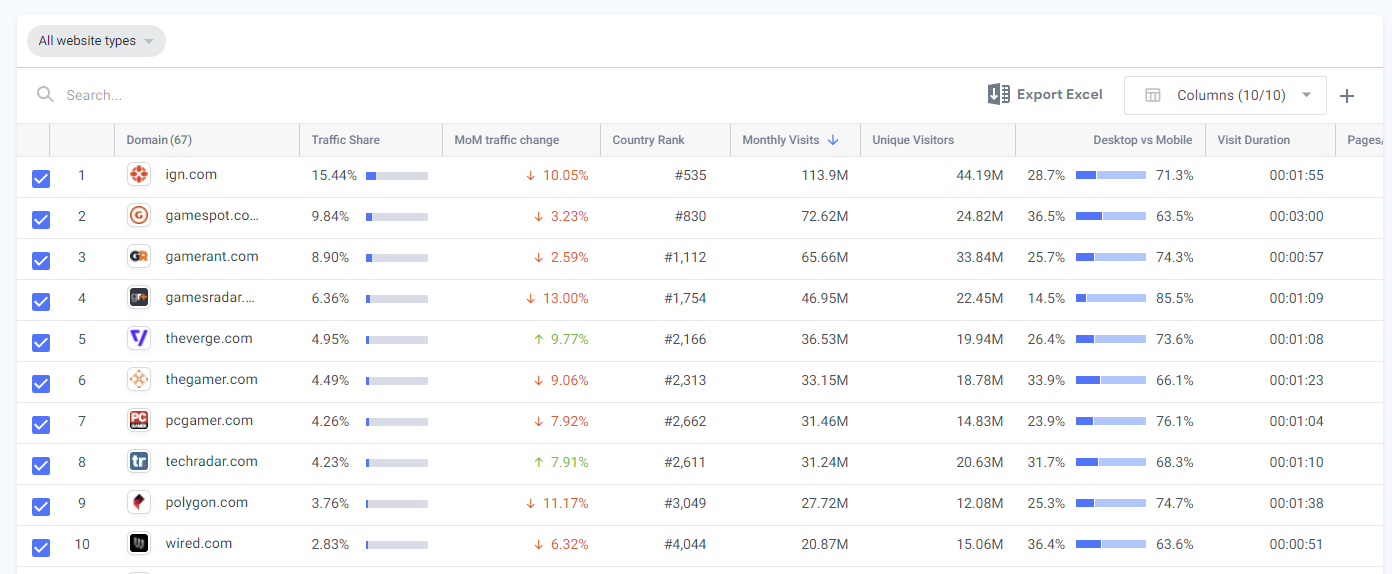
- Because consolidation isn’t just something these sites are reporting on.
- As we’ve been covering for a while, the critical and journalistic space around games is getting squeezed.
- It’s not even the first time IGN have gone on an acquisition spree.
- And that didn’t end well when they bought 1Up.com
IGN news is a total bummer. back when i was at 1UP, they bought it to add value to their portfolio, stripped it for parts, and took no effort to maintain any of the content after shutting it down. and it would be even more tragic if all of this wasn't so boring and obvious by now
— Bob Mackey (@bobservo) May 21, 2024
- And of course, when this current acquisition happened - Staff were immediately laid off at the purchased sites.
- before the sale was announced.
- In several cases, this was decade spanning veterans of the medium.
- People like Brendan Sinclair of Gamesindustry.biz or Stephany Nunnely-Jackson of VG24/7 or Alice Bell of Rock, Paper, Shotgun, who at time of writing was the only editorial leader on the site.
- As captured by Aftermath in interviews following the news, Bell suggested that the scale of the cuts was as yet unclear to the public -
“The Network has lost a lot of phenomenally talented people, both in front-facing editorial and in more behind-the-scenes roles,” she told Aftermath. “It looks like at least one person from almost any department at a company like this you can imagine got some bad news today.”
- So why buy these sites only to lay off the people who actually make them worthwhile?
- And why should you, the audience care?
- The landscape of games media is a rocky one right now.
- And there’s a lot of people both in the audience and c-suites arguing that audiences should get their news from personalities reading documents live on twitch or tiktok or by searching for an AI generated summary.
- Which is short-sighted.
- Because without the journalism and people that create those documents and summaries, there’s nothing worthwhile for them to review.
- If the industry keeps cutting out its veterans, and cutting costs to have things run as cheaply and optimised as they can under a few umbrellas - then the good work doesn’t get done for the benefit of audiences.
- So this is us taking a look at the gaming landscape right now.
- The consolidation, the focus on SEO that was created by Google and is now being punished, and the sheer void that’s beginning to open up as the people in power don’t respect the work that's done by the people they're firing.
The Media Landscape
- As of us looking at it right now, there are 16 companies who own the vast majority of games press.
The Games Media Industry in ~16 Companies
IGN Entertainment
IGN, GamesIndustry.biz, Eurogamer, Rock Paper Shotgun, VG247, Dicebreaker.
Fandom
Gamespot, Giantbomb, Fanatical, GameFAQs, Metacritic
Future PLC
Edge, Gamesradar+, PCGamer, Play, RetroGamer,Techradar, TotallyGame,
Gamestop (the store)
Game Informer
Valnet
Gamerant, The Gamer, DualShockers, HardcoreGamer
Network N
PCGamesN, WarGamer, StrategyGamer, PocketTactics
Conde Nast
Ars Technica, Wired
Vox Media
The Verge, Polygon
G/O Media
Gizmodo, Kotaku
Hookshot Media
Nintendo Life, Push Square, Pure Xbox, Time Extension
Gamurs
DotEsports, ProGameGuides, Gamepur, Twinfinite, Primagames, Touch Tap Play, GamerJournalist, Attack of the Fanbiy, We Got This Covered, The Mary Sue, Destructoid, Operation Esports, PC Invasion, Upcomer, The Escapist, Siliconera, Gameskinny
Yahoo!
Engadget, Techcrunch
Steel Media Inc (mostly mobile based)
PocketGamerbiz, BlockchainGamerBiz, PCGamesInsider, Appspy,BeyondGames.biz
BGFC
WePC, Videogamer, N4G, PCGuide
Mobafire
Mostly individual game guide/coverage sites or stat trackers, also MMORPG.com and Resetera
Independent Sites
VGC, Digital Trends, Aftermath, RPGSite, Insider Gaming, Stevivor, Digital Foundry, Techraptor, Game World Observer, Gematsu, Dexerto
- With more in other traditional spaces like BBC Newsbeat or folks Gene Park at the Washington Post - but these are:
- Generally internal verticals with limited impact
- As we’ve seen with the Washington Post gutting Launcher, still not safe from random whims of corporate.
- And it doesn’t include small, criticism focussed spaces like Critical Distance or Into the Spine because those are almost entirely focussed on critical journalism, rather than news.
- Which means for big industry spanning sites that cover everything and have the resources to cover news, reviews and longer form work, there’s collective groups that own individual sites.
- This isn’t some sort of conspiracy where the narrative is controlled and manipulated.
- For the most part these overarching companies could not give a damn about what’s published.
- As long as it drives advertising revenue.
- In many cases, these companies have banded together to survive more easily.
- Sharing resources and back end staff in Legal or Site maintenance.
- As well as advertising network contacts.
The Advertising Angle
- Because there’s another angle to this - Gamer Network aren’t just a set of sites.
- They’re also an advertising network.
- And it’s a successful network, one that also supports the Hookshot group and even VGC.
- An advertising network now controlled by the biggest player in the space, who have now got less of an incentive to support smaller competitors.
Our ad sales partner Gamer Network was today acquired by Ziff Davis/IGN
— Hookshot (@hookshotmedia) May 21, 2024
We want to clarify that our teams at @nintendolife @pushsquare @purexbox & @timeextension64 are unaffected by the redundancies, and we continue to operate independently
Our thoughts are with those affected https://t.co/vc70hCBj3E
Would you support a VGC Patreon? (And if yes, what kind of content would you like to see?)
— Andy Robinson (@Andy_VGC) May 21, 2024
- But it’s all about advertising, and all about optimising those visitors.
- That’s why Guide content is so relevant to long term health, because someone is always going to be googling “How Do I Unlock X Gun in Call of Duty”
- Now Google are pulling the rug out.
- Meaning companies are scrabbling to find other ways to ensure ad revenue stays up.
- Why is this important?
- Well Google has spent the last few years tinkering with their Search Engine.
- Partially to highlight their AI nonsense that will simply scrape existing sites, deny them visits and also get it wrong.
- But partially to create a better environment for users as SEO optimised sites that don’t create a good experience are punished.
- They’re doing this though after making SEO optimisation the only way to survive for years.
- Because these sites only work this way to actually survive Google’s SEO dominance.
- But it also means there’s value for a big corporation in consolidation.
- If a story is on the front page for IGN, Eurogamer, VG24/7 and Rock,Paper,Shotgun - then Ziff Davis wins regardless.
- And those three sites are respected sources.
- Because while they 100% optimise for search, they’re not in the same league as any of the AI slop that gives rise to the likes of Glorbo.
- If a story is on the front page for IGN, Eurogamer, VG24/7 and Rock,Paper,Shotgun - then Ziff Davis wins regardless.
- But in a lot of cases - as we saw with Fandom/Gamurs and more in the last few years - these companies have been sold to a private equity firm or to some uncaring corporate behemoth.
- Who just knows the brand name and wants the value that brings.
- The people aren’t so relevant.
- It’s the same here.
- The people behind these sites aren’t valuable to the decision makers - they’re an expense.
- Especially if their senior salary can be replaced with a newcomer who’ll take an even lower wage.
- The Brand will continue.
Is there a way out?
- You can be independent and succeed.
- Dexerto is independent, and by the metrics above very nearly in the top ten sites - they play the SEO game like a fiddle.
- Sites like RPGsite lean into a niche and continue to grow within that.
- And more general sites like VGC can survive while being independent and trying to cover the three pillars of news reporting, criticism and more in depth work.
- You can even point to the likes of Aftermath and Second Wind, which are more culturally focussed on critical blogging or entertainment media respectively.
- We have seen individuals with newsletters like Stephen Totilo of Gamefile or Nathan Brown of Hitpoints turn out genuinely great journalistic work.
- But what everything above is at best is limited.
- Aftermath, Second Wind, the newsletters, all of those are coming from long term industry veterans with established followings
- They are not necessarily training up new voices.
- Though as of today, Aftermath have just published their first freelance piece after hitting their crowd funding goals.
- They do not have the capacity to fill every niche of interests - or even just to cover every story.
Can’t wait for games media to be two companies with 10 chronically harassed and overworked employees and a handful of indie outlets that are barely breaking even on patreon
— Jessica Cogswell (@awildjessichu) May 21, 2024
- That requires infrastructure and a massive staff like you see with the likes of IGN, Dexerto or PCGamer.
- Or it requires lots of smaller outlets that can find their niche and survive.
- And they’re not always going to survive in the wake of SEO nonsense like Google’s pulling.
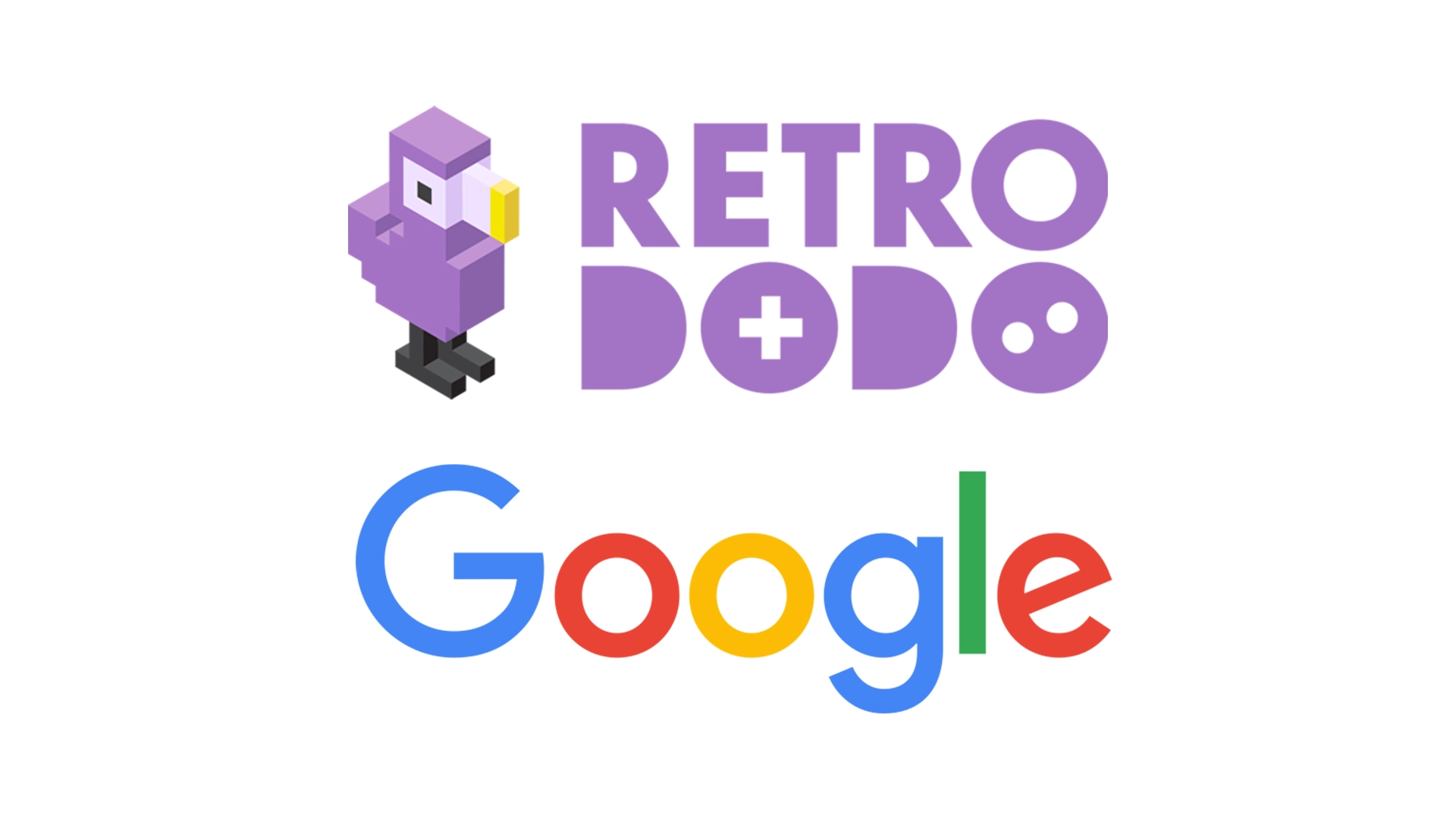
- And new media like Youtube and Tiktok are not a perfect replacement for these layoffs and this industry consolidation.
- There are journalists in this space - folks trained in working ethically and responsibly to pull stories together and report them like People Make Games or who have developed their own critical space like SkillUp.
- But those are the exception, not the rule.
- The Tiktokers and Streamers reading documents while half arguing with chat aren’t doing the same thing as a dedicated press.
- Reading and reacting to news as it happens is a form of journalism.
- It’s punditry and that’s okay as part of a balanced diet.
- But the problem with reactionary work like that is, that it’s only as good as what you’re reacting to.
- And who is catching your mistakes as you make them.
- Editorial at these sites is not just spellchecking.
- It’s experienced individuals who are guiding writers to the best versions of their story, who have the knowledge and contacts to pull quotes from and who have the ability to make the medium better.
- Let alone knowing what will end up as libel and being able to check with the legal team.
- The three individuals let go by IGN represent this perfectly.
- Even for us - please do not take us as saying we are above this.
- Most of what we do is story aggregation.
- We sometimes have stories through our tips email, or we find ourselves able to report directly.
- But our setup relies heavily on a strong press being able to do the work.
- And us being able to trust that work, then synthesise/analyse what’s happening.
- Whether it’s reporting, interviews or reviews, It all comes under the broad umbrella of games journalism.
- We are not a solution for all of that vanishing or being harmed by cutting out every person who has a decade of experience - or removing jobs that let people live sustainably.
- The original reporting that we value as part of a wider media ecosystem has to be valued.
- As we settle in for the summer showcase season, where the industry will rush to show off their latest titles in the best light possible (after a year of layoffs for the staff making the games), this consolidation and reduction in staff will hurt you.
- This will mean less staff reporting, with less experience, trying to hold an industry to account and to criticise what they see - and being less able to deliver for you.
- Returning to Aftermath’s interview with Bell, the most important thing of all of this is clear.
- None of this serves the audience.
I am most worried about people's livelihoods, but I am also very worried that they won't be allowed to be weird and write thoughtful, critical things. I worry that, now that the machine has increased in size, it will necessarily crush my most talented peers from the Network into writing boring, SEO-focused things designed to appeal to the averaged-out reader. But people aren't average, so when you try to appeal to the average you end up appealing to nobody.”



